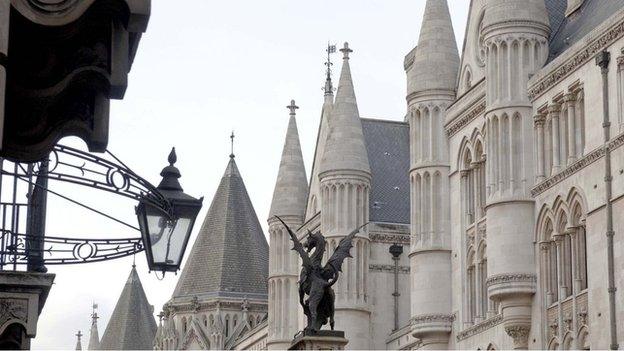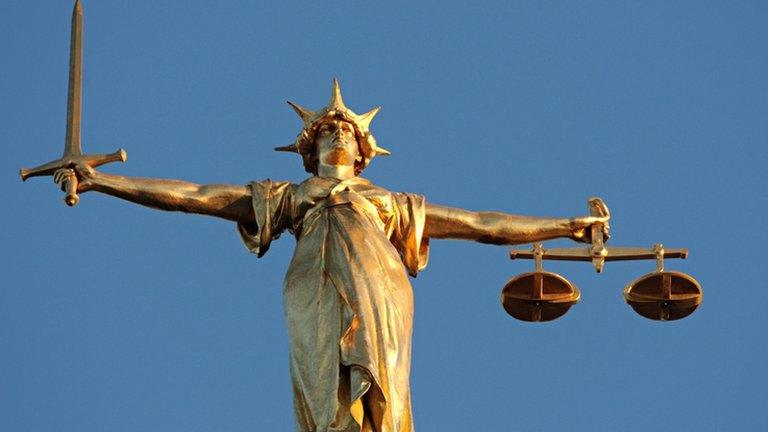Secret trial plan 'serious threat to justice'
- Published

Three judges heard an appeal against an order issued in May banning access to the trial
A terrorism trial that may be heard in secret risks "undermining the public's confidence in justice being done", the shadow justice secretary has warned.
The Crown Prosecution Service wants it to be heard behind closed doors on the grounds of national security. It would be the first such trial in England.
Shadow justice secretary Sadiq Khan warned that "a cloak of secrecy on this scale is unprecedented".
Justice Secretary Chris Grayling said it was "a matter for the courts".
The Court of Appeal will rule in the next few days in a media challenge to restrictions on the case.
Reporting restrictions sometimes cover specific parts of cases, but the major terrorism case - which relates to two defendants referred to as "AB" and "CD" - would be the first to feature a jury in a normal courtroom hearing evidence in secret.
The court heard that AB and CD had been arrested "in high-profile circumstances" and faced allegations of the preparation of terrorist acts and possessing bomb-making instructions.
"Open justice isn't some optional add-on - transparency and openness are absolutely critical to the way our courts run," said Mr Khan.
He added: "While there will always be exceptional circumstances in which parts of cases may need to be held in secret, very important questions need answering as to why, in this instance, the whole case needs be held in secret."
Shami Chakrabarti, director of civil rights organisation Liberty, said allowing such a secret trial would set a "very dangerous precedent".
"That's just not justice," she told BBC Radio 4's Today programme.
"The dangers of this kind of process are obvious in terms of fairness and public confidence in a decent justice system that is both fair and secure."
'Watching suspects'
Court of Appeal judges have heard that if a decision was taken to hold the trial in open court, and to identify the defendants, the Crown Prosecution Service (CPS) could abandon the prosecution.
Asked if it would be better to drop the trial and release the defendants, Ms Chakrabarti said: "Well, occasionally fairness does require that, and that doesn't mean that people just walk our streets unencumbered.
"It means that the authorities have to do their job of watching suspects even more closely... expending some resources and then prosecuting when there is evidence that will stand up at a fair, open trial."
Lord Carlile, a former independent reviewer of terrorism legislation for the government, said he "agreed entirely" with a default position "that all trials take place in public".
But he added: "There may be very rare exceptions, and I'm sure that the Court of Appeal will say if there are exceptions.
"They must be extremely rare, in which the safety of the public or the safety of those who protect the public is so endangered that one has a choice between either trial behind closed doors or no trial."
Justice Secretary Mr Grayling told the Today programme the law allowed "very rare occasions where trials or parts of trials can take place in camera, in private - this is always a matter for the judges".
"I know our senior judiciary very well, I know that they will want to protect the interests of justice, and I am very confident that if they take a decision on a very difficult matter like this, they will do so in the interests of justice," he added.
Reporting ban
Details of the case emerged at an appeal against an order issued in May by Mr Justice Nicol, which banned the identification of the defendants and access to the trial.
The media were banned from reporting the existence of that order until the Court of Appeal hearing.
Richard Whittam QC, for the CPS, said the AB/CD trial was an exceptional circumstance.
"There is a justification for defendants to be anonymous and there is jurisdiction for the court to sit in private," he said.
The complete ban on reporting the case may not exist forever, he added.
- Published4 June 2014
